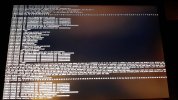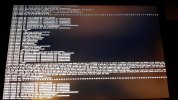Hello.
Proxmox 7.2-11
My host freeze or crash, even if the RAM is 50% free. Sometime after 2 days other time after 26 days, in 90% of cases during nighttime.
First case, just freeze the webUI and SSH but responds to ping.
https://postimg.cc/K4M2CHfd
Second case, complete crash, probably IRQ related.
https://postimg.cc/Dms9xbyh
What other useful info (eg. log files) should I post ?
Please advise.
Thanks.
Proxmox 7.2-11
My host freeze or crash, even if the RAM is 50% free. Sometime after 2 days other time after 26 days, in 90% of cases during nighttime.
First case, just freeze the webUI and SSH but responds to ping.
https://postimg.cc/K4M2CHfd
Second case, complete crash, probably IRQ related.
https://postimg.cc/Dms9xbyh
What other useful info (eg. log files) should I post ?
Please advise.
Thanks.



